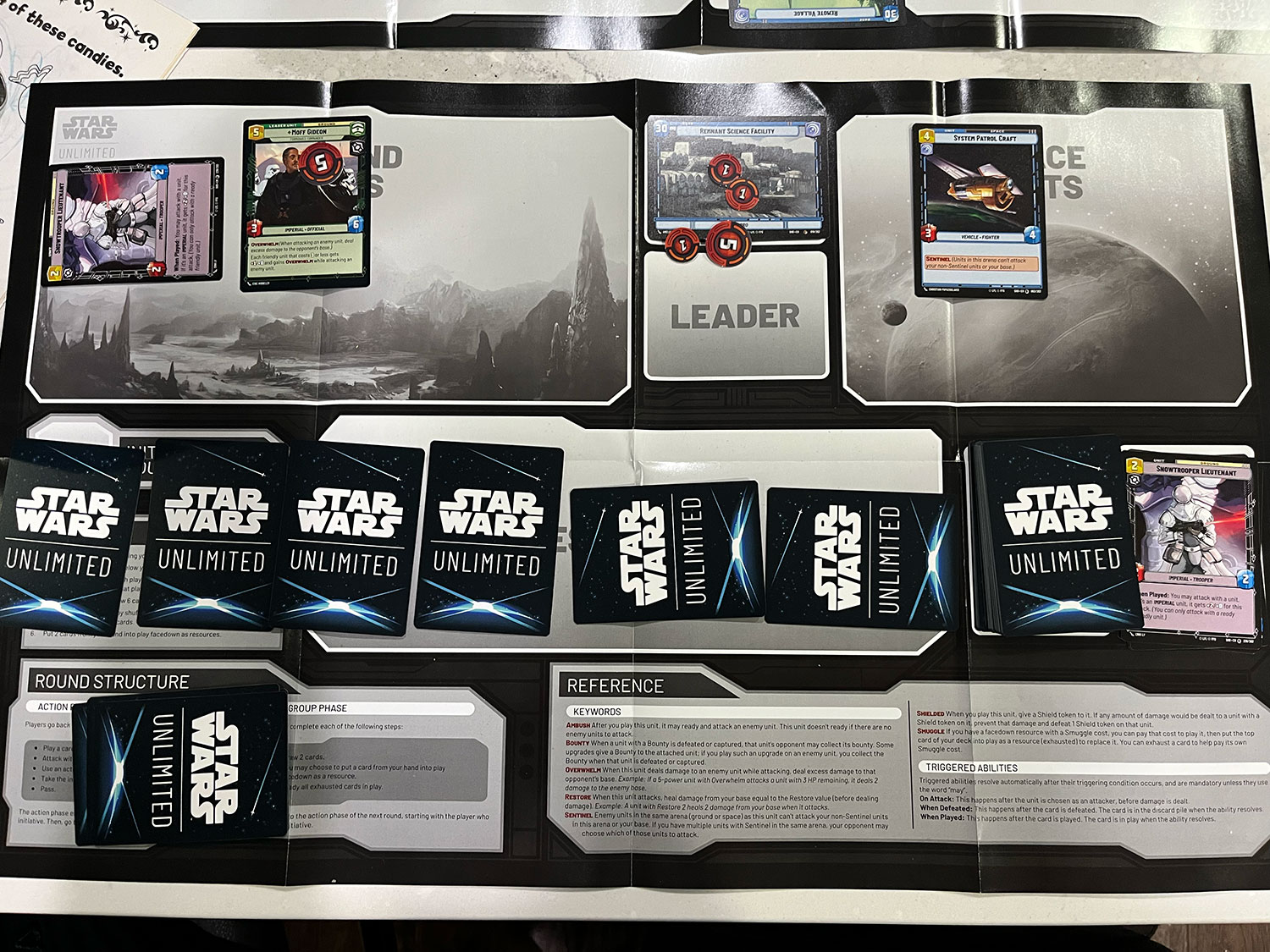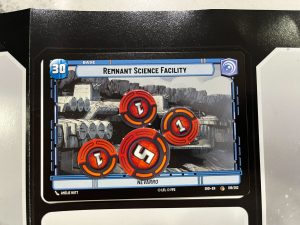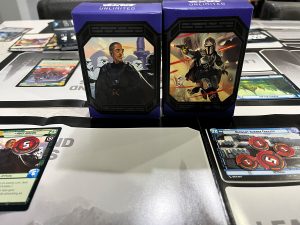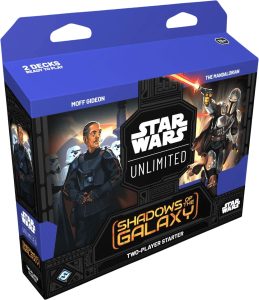 As mentioned in my review of Star Wars: The Deckbuilding Game Clone Wars Edition, I have been a Star Wars fan since my next-door neighbor sold us an original RCA VHS VCR and we got copies (or bootlegs) of each Star Wars film. I was also an original early adopter of Star Wars the Collectible Card Game by Decipher inc. We ran an amazing legal-ish scheme* to get free holiday gift cards at the local strip mall to buy boxes of that game.
As mentioned in my review of Star Wars: The Deckbuilding Game Clone Wars Edition, I have been a Star Wars fan since my next-door neighbor sold us an original RCA VHS VCR and we got copies (or bootlegs) of each Star Wars film. I was also an original early adopter of Star Wars the Collectible Card Game by Decipher inc. We ran an amazing legal-ish scheme* to get free holiday gift cards at the local strip mall to buy boxes of that game.
But we were teenagers and once the Holidays ended we could no longer afford as many decks and we lost the thrill of the game. I have since gone on an outright boycott of all CCGs and have limited my card games to LCG or simply deck-building games. So this is my first foray back into a CCG (or now Tradable because they don’t want people to remember how much money they have sunk into CCGs over the years). Will the Star Wars Unlimited: Shadows of the Galaxy game win me over? Read on to find out.
Gameplay Overview:
If you’ve played Magic: The Gathering, Lorcana, or similar games CCGs, you know how to play. Like Lorcana this game has the excellent mechanism to use cards as resources.
To start the game, players put their base and their leader into play, for this Starter Deck that is The Mandalorian or Moff Gideon. Each leader has an action they can do when not an active unit and then a trigger that makes them deploy as active units. When the leader is defeated he is returned to the leader area of the play area and can never be deployed again.
Next each player draws 6 cards to form their hand and chooses two cards to be resources (used to pay the cost to play a card from your hand).
The game is played in two phases, Action Phase and Re-Group phase. During the Action Phase players alternate choosing one action from the list below:
- Play a card (by paying its resource cost). Cards can be units (space unit or ground unit), upgrades, events, or tactics. All unit cards enter the game “exhausted” unless a special ability or card makes them enter “ready.” Exhausted cards can not attack or use actions, but can be attacked and defend themselves.
- Attack with a unit. Space Units can only attack Space Units and Ground Units can only attack Ground Units. Attacks are resolved by subtracting the Hit points of the defending card from the Power value of the attacking card.
- Use an action ability, located in the text box on the cards.
- Take the initiative (this makes you the first player next turn, but ends the round for you)
- Pass. When both players pass in a row, or one player takes initiative and the other passes, play enters the regroup phase.
Regroup Phase:
- Players draw two cards.
- Players may convert one card into a resource.
- Ready all exhausted cards and then start the next action phase.
Game End:
Game ends when one player has dealt 30 damage to the opponent’s base.

Game Experience:
Unlike Magic, play starts right away as you start the first round with resources to deploy cards and/or play actions and the fun doesn’t stop until the base is defeated. You can choose to attack units or the base, unless the opponent has a Sentinel who you must attack first. This is where the majority of the strategy comes into play. As all damage spent on opposing units is damage not spent on the base.
In addition to action abilities that cause characters to be exhausted, many units have triggered abilities (On Attack, When Defeated, When Played), Keyword abilities, and constant abilities that remain active as long as the cards are in play. Each of these when combined with upgrades, events, and tactics makes for a game that plays differently each time. This is great as it causes players to constantly reassess their strategy.

I also really enjoy the strategy of when to take initiative versus when it is okay to go second and get in an extra attack. Gorgu, for example, starts with zero Power points, but an action ability to exhaust an opponent’s unit. So taking the initiative and ending your phase early could be a good strategy so that he can exhaust an enemy’s strongest unit before it has a chance to attack.
Each leader lends itself towards a strategy when building decks, as The Mandalorian gives bonuses when upgrades are added and Moff Gideon gives bonuses to units that cost 3 or fewer. So obviously when building decks with these leaders you should fill The Mandalorian deck with upgrades and Moff Gideon’s deck with lower-priced units.
For this review, I used the starter deck only and found them to be well balanced, but like any card game the luck of what cards come into your hand and when affects the outcome. For example, in one game Moff Gideon’s starting hand had 4 units that cost 3 or fewer and this allowed him to add +1 to one of those unit’s attacks each round and then when deployed in the fourth round added +1 to each friendly unit and this led to a commanding assault on the base. A second game the more inexpensive units came out later and altered the deck’s success.

Speaking of Gorgu, The Mandalorian, and Moff Gideon, the theme of Star Wars, in general, comes through strongly. It is fun to use character’s weapons, and actions that come straight from the shows/movies. I think if I was reviewing the cards from the original trilogy, I would have been even more excited by the theme as I have a longer connection to them than The Mandalorian.
We played five games and the results were two wins for The Mandalorian and three for Moff Gideon. Moff Gideon seemed to perform better when rushing out as many units as possible and going straight for the base as The Mandalorian deck creates units with powerful upgrades which are great at delivering powerful attacks but require resources to be spent on the upgrades and not on units to counter the onslaught of inexpensive imperial units.
Final Thoughts:
Overall, a very fun game that can be customized any way you want by bankrupting yourself by buying as many packs or individual cards as you can afford. This as I mentioned above, is a terrible feature for a game. But since there is no Star Wars: Unlimited LCG and this game is better than Star Wars: The Deck Building game (which I previously reviewed and enjoyed) you have a few options. One, just buy the starter decks as they come out and alternate which deck you use, or two, make a budget, stick to it, and enjoy crafting a deck that you have fun using. I will be doing the first option.
The other inherent flaw in “tradable” card games is that if you spend more than your friends and build better decks than your friends, no one will want to play with you and your super decks, so the game will just sit on your shelf. God, I hate the collectible card game model.
Final Score: 4 Stars – I am a sucker for Star Wars themed games and this one uses the theme well and almost has me interested in investing in a “tradable” card game. But, I think I will settle for buying all of the starter decks and just rotating which deck I use. I wanted to rate it a 0/5 because of it being a tradable card game, but I refrained.
 Hits:
Hits:
• Use of cards as a resource is a great way to manage currency in a card game.
• As starter decks these work great to introduce players to two strategies that can be used to help players build their own decks in the future
• Very easy to learn, teach, and play.
Misses:
• It is a TCG and not an LCG
• Attacking the base and ignoring the character cards is a viable option and leads to way fewer player interactions.
*Details of the Scheme: The Strip Mall offered $10 gift cards per $100 spent in the strip mall. So we stood outside of the grocery store and told people we were local college students in a marketing class and we were researching if local advertising was effective at influencing local purchases. We asked everyone exiting the grocery store if we could have their receipts and we obtained thousands of dollars in receipts which led to hundreds of dollars in gift cards. Genius! Hopefully, the statute of limitations has run out if that was more illegal than we thought.
Disclosure: An employee of Asmodee also writes for Board Game Quest. He had no influence over the opinions expressed in this review.
Source: Board Game Quest





